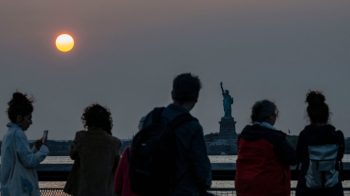Without tourists, Egyptian business owners adapt
In 2013, Marketplace’s Kai Ryssdal had a chat with Cairo shopkeeper Emad Nour Hafez about how political instability since Egypt’s 2011 revolution was affecting his tourist shop. Since then, Egypt has had more ups and downs, but tourism has never really returned to the pre-Arab Spring heyday.
Hafez is still in his shop, selling jewelry boxes and backgammon boards inlaid with mother-of-pearl in ornate patterns. But fewer foreigners frequent the labyrinth of narrow streets and alleys of Cairo’s Khan el-Khalili bazaar, and Hafez has had to adapt.
“I changed my [life] completely,” he says, “because four years now, no tourists. I have a family, I have kids, I have my parents also.”
Even though he says he’s working longer and harder days, Hafez says his monthly income dropped by half after the 2011 revolution, and is only just now starting to creep back up. And it’s not because of sales in his shop, even though Egypt’s tourism numbers have recovered a bit. The April tourism numbers, the most recent available, are getting close to the pre-revolution levels. But if you look at the winter “high season,” there’s still a big gap. For example, in December of 2010, Egypt welcomed 1.28 million visitors. In December of last year, there were only 781,602.
Hafez does still get some customers — locals coming in to order custom arabesque-style furniture. But most of his tourist items get exported in bulk to Europe and to Gulf countries. Changing the way he does business hasn’t been easy, or cheap.
“I must pay for shipping,” he says. “I must pay for taxes. There is cargo from my shop to [the] airport, you know. There is a lot of things.”
Before the revolution, when he was only exporting 20 percent of his products, those taxes and shipping costs weren’t that bad, he says. But now he exports 80 percent of his merchandise. And Hafez isn’t the only one. Across the courtyard, fellow shopkeeper Mohamed El-Zoualy sells hand-cast and etched pots and lanterns, polished on machines just around the corner.
“Before, if you produced a thousand pieces, you’d sell 200-300 in your shop, and export the rest,” El-Zoualy says. “Now if you produce the thousand pieces, you have to export them all.”
Shopkeeper Mohamed El-Zoualy (Amir Makar)
El-Zoualy says he’s not too worried, since he still gets custom orders for lights and fixtures from local businesses, and has a stable of European customers who buy his goods in bulk.
“I am a producer, I know where to put my products,” he says. “The man whose shop is closed now, he used to rely on souvenirs. Now, of course, in the times we are living, there are no customers, so things have stopped for him.”
Hafez says the only way for businesses like his to survive is to be flexible. As evidence of what happens when you’re not, he references hundreds of shuttered shops in the bazaar — businesses he says didn’t adapt.
“They stopped in the same place. They are still waiting [for] the tourists, and the tourists doesn’t come.”
Hafez thinks the new military-backed government will lure tourists back to pre-revolution levels, but he’s going to keep focusing on exports for now, just in case.
There’s a lot happening in the world. Through it all, Marketplace is here for you.
You rely on Marketplace to break down the world’s events and tell you how it affects you in a fact-based, approachable way. We rely on your financial support to keep making that possible.
Your donation today powers the independent journalism that you rely on. For just $5/month, you can help sustain Marketplace so we can keep reporting on the things that matter to you.


















